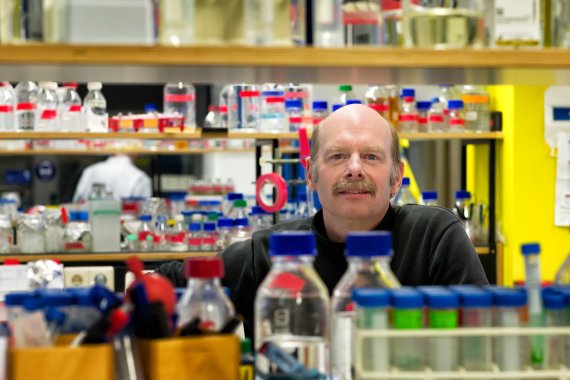<John van der Oost, photo: Guy Ackermans>
Editas is paying 6.25 million dollars to use a total of seven patents in the names of Massachusetts Institute of Technology (MIT), Harvard University and Wageningen University, and another 10 million dollars in exclusivity fees, some of which go to WUR. WUR patent expert Paul van Helvert, who was involved in the agreement with Editas, cannot mention figures. ‘But it is the biggest patent-related deal I have ever struck,’ he says. The patent fees could increase further if Editas develops successful applications of the CRISPR technology.
The biotech company wants to develop medical applications with the CRISPR technology, for which it wants to use knowledge about the enzyme Cpf1, with which precise changes can be made in the genome. The Wageningen microbiologist Van der Oost discovered how this enzyme works. ‘It is an immune system for bacteria to resist viruses,’ explains the professor. ‘The enzyme attacks the DNA of viruses, copies a fragment of virus and builds that into the CRISPRs, the recurring pieces of DNA in the bacteria. This way Cpf1 renders the bacteria immune to the virus. Half of all bacteria have this immune system.’ Van der Oost and his American colleagues can for instance replace or repair DNA in plants, animals and humans using Cpf1. In 2015 WUR applied for a patent on his discovery.
Subsequently Van der Oost contacted his colleague Feng Zhang at MIT. This American university has several patents related to CRISPR technology under the auspices of the Broad Institute. MIT and WUR decided to cooperate in the exploitation of their combined patent portfolio. Editas Medicine will now get the exclusive worldwide right to medical applications of this CRISPR technology. The expectation is that it can be used to repair genetic defects such as certain forms of cancer in a very targeted fashion.
The universities are looking for other companies for applications in plant biology. Universities and non-profit organizations can just go on using the patented CRISPR technology for scientific research.
What WUR is going to do with the patent revenues is still under discussion. Some of the income will certainly go towards new research, says Van Helvert. Van der Oost would like to use the patent revenues to support innovative biotechnology research in Wageningen.

